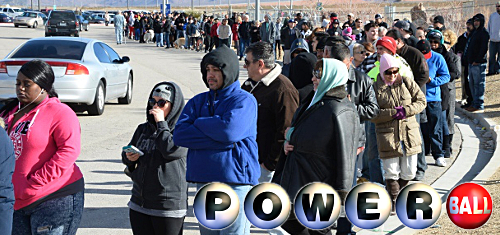 As Wednesday’s PowerBall jackpot tops $400m, a new Gallup poll is poking holes in the widely held theory that poorer, less educated Americans are more likely to buy lottery tickets.
As Wednesday’s PowerBall jackpot tops $400m, a new Gallup poll is poking holes in the widely held theory that poorer, less educated Americans are more likely to buy lottery tickets.
A telephone survey of 1,025 US adults in the month of June showed 49% of participants bought a state lottery ticket in the past 12 months. The figure is up from a historic low of 46% in 2007 but well off the 57% peak of the mid- to late-1990s, despite seven more states launching lotteries since that period.
Around 40% of participants who earned less than $36k per year had played the lottery in the past year, compared to 56% of those making between $36k and $90k, and 53% of those making over $90k.
The numbers were slightly more balanced in terms of education level, with 47% of those holding a high school diploma or less playing the lottery, compared to 53% of those holding a technical or college degree, while post-graduates scored lowest at 45%.
On a broader note, nearly two-thirds (64%) of American adults engaged in some form of gambling in the past 12 months. Casino gambling ranked second behind the lottery at 26%, while 15% joined an office betting pool and 10% admitted wagering on pro sports.
All other gambling activities mustered only single digit levels of participation, including video poker machines (9%), horse racing (6%), bingo for money (6%), college sports wagers (5%), boxing wagers (3%) and ‘other’ types of gambling (9%). Real-money online gambling brought up the rear with 3% participation.
While the online gambling figure remains low, it’s a historic high since Gallup began asking the question in 1996. The previous survey in 2007 showed 2% had gambled online using real money.
All forms of sports betting were up slightly from the 2007 numbers but down sharply since Gallup began its surveys. In 1989, 22% of respondents admitted gambling on pro sports, 14% gambled on college games, 22% played office pools and 8% bet on boxing matches.
In terms of problem gambling, only 7% of the 2016 survey participants admitted that they occasionally gamble more than they should, while a similar percentage claimed that gambling had been a source of strain within their families.
In socio-economic terms, lower-earning individuals were only slightly more likely to admit overspending on gambling (11%) than the top earners (7%). However, lower-income Americans were more likely to say gambling had been a source of familial strife (10%) than the upper demos (3%).
In June, Gallup published the results of its latest survey into American views on morality, which showed 67% of Americans found gambling to be “morally acceptable,” versus just 27% who found in unacceptable.